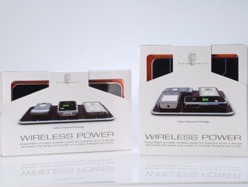Wireless chargers' eco-creds questioned
Critics want to see independent tests and efficiency metrics

Wireless charging technology, such as the recently announced Powermat that finally broke cover at CES, is under fire for claims its backers are making about the tech's green or eco-friendly credentials.
The idea of a wireless charger is clearly appealing, to anybody whose house is, like ours, full of random wired chargers for our many phones, handheld consoles and gadgets (as well as even more bags of old chargers that we have no idea about anymore, but feel too eco-guilty to throw in the bin and too forgetful to take to the recycling…)
TechRadar was impressed with what we saw of the Powermat tech at CES, although the crackles of electricity coming from the mat did give us slight concerns about the efficiency of wireless charging, not to mention safety in the home and the technology's viability for use with kids!
"Everybody's mouth drops when we show our products," claims Ron Ferber, CEO of Powermat. "You could have wireless chargers anywhere in your kitchen, hidden in your walls, and can charge multiple devices at high power."
Nothing to substantiate claims
Wired notes this week that "the companies working on next-gen wireless power have done nothing to substantiate their claims of greater efficiency."
The report also reminds us that such ideas are far from new: "Physicist Nikola Tesla offered theories on wireless power transmission in the late 1800s. But concerns about power efficiency and loss have kept the products from going mainstream."
Sign up for breaking news, reviews, opinion, top tech deals, and more.
Currently, wireless charging tech captures "only about 60 percent of the power to begin with and then convert it to DC, so there's a significant loss to deal with."
Standard wired phone chargers "boast an average efficiency of at least 80 percent," according to Chris Calwell, director of policy and research at the energy-conscious Ecos Consulting.
Take those claims with a grain of salt, says Calwell suggesting caution about the eco-credentials of new wireless chargers, at least until there are standardised energy ratings and independent tests to guarantee the efficiency and safety of the devices.
When asked about the energy efficiency of his products Powermat's CEO Ron Ferber, jokingly told press, "I could tell you, but I would have to kill you!"
Adding, as a disclaimer: "We are using multiple technologies today to eliminate the biggest issues with wireless charges related to slow charging and low efficiency."
